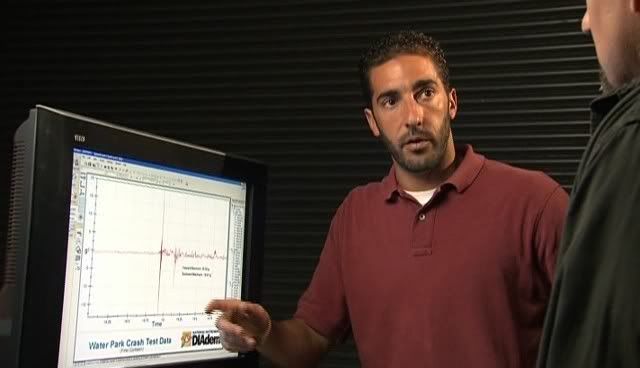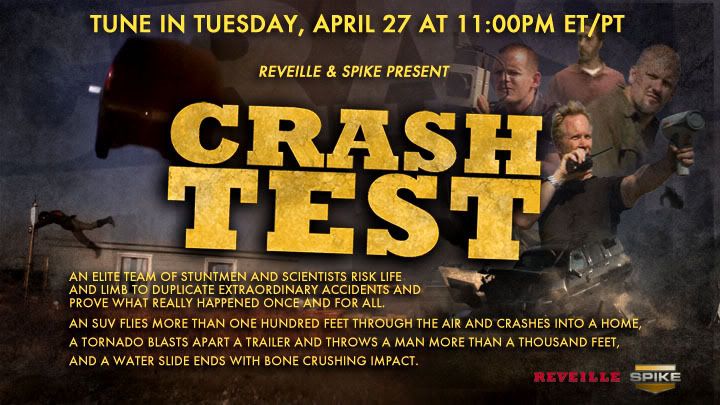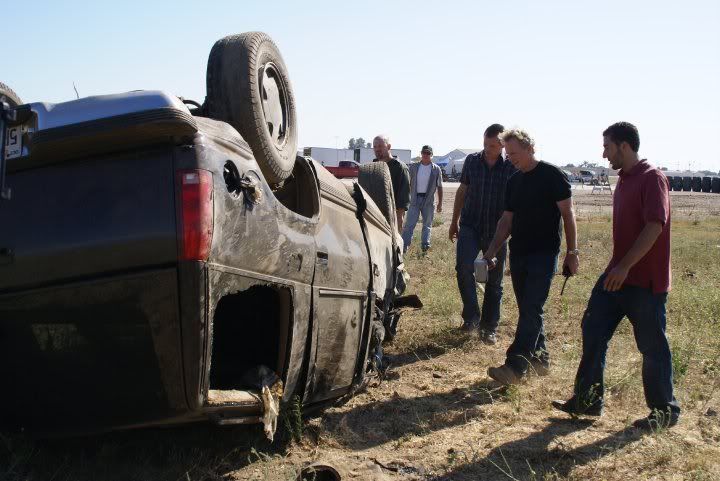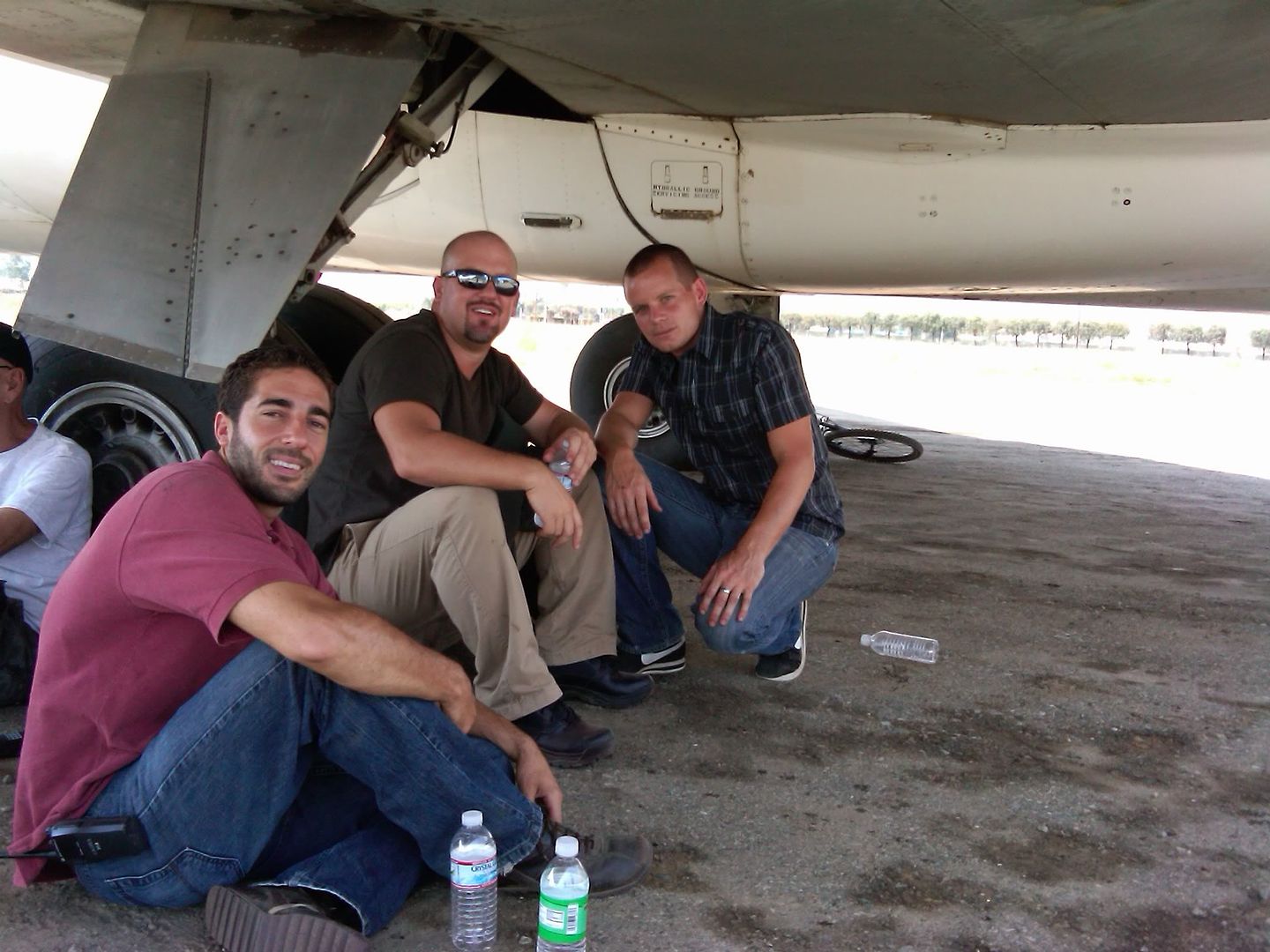This is part 1 of a 3 part series. Part 1 is about being on the set of a Reality TV Show.
Exactly a year ago, I was thrown into a reality TV pilot titled Crash Test, which aired on Spike TV on April 27th, 2010. On Crash Test, we used top-notch stuntmen and stuntwomen to recreate accidents and crime scenes to see who was really guilty or innocent.
I was the "biomedical scientist" of the bunch, and took measurements to determine if the real-life accidents would have really occurred in our simulations had we not been using professional stuntmen and women.
For reasons I'd rather not get into, the show is not moving forward with a whole season, despite its rave reviews from both sexes and all age groups (further despite the bad rating on IMDB... who's the clown that gave us a 1/10?!). So at this point, I'd like to add my perspective.
I was thrown into the project at the absolute last minute, and even missed a day of filming. I had one full day to prepare, which included finding sensors, programming my hardware and software, doing the research on the accidents we were about to recreate and how I should take measurements.
Being on set was absolute chaos, and probably the coolest experience of my life up to this point -- and I'd like to thank Reveille Studios, Tim Prokop, and Spike TV for giving me this incredible opportunity. So here is what I learned from being the geek on the set of a Reality TV show:
- Come Prepared (Gear)
If you're doing anything technical, you better make sure your stuff works PERFECTLY before getting there, and is completely self-contained. When your gear is needed, there is absolutely no time to make last-minute changes or fix a programming issue.
Your devices need to be self-contained. You are not guaranteed how far away it will be or if there will be power nearby. You need to be able to flip a switch and have it ready to go.
There might also be a lot of time between turning it on and when the film is actually rolling (see the "Hurry up and Wait" section), so make sure you have a lot of memory and battery life.
At this point, I must give a shout-out and thank NI Systems Engineering* for their assistance, specifically David Harding. Also Otmar, Caroline, and Simon in NI DIAdem and LabVIEW Marketing, and my good buddy Paul Mandeltort for being all-around smart as hell. Thanks guys!
*(side note: If you're an NI customer working on a very large project and are not leveraging these resources, you're crazy NOT to contact your local rep and make sure you're doing things right!)
- Come Prepared (Research)
You are the expert on whatever the hell you're doing. Or so the country believes. One of the directors is going to be asking you questions from your perspective. You need to know what's going on, and how to compare it to real world stuff so that the audience has a clue what you're talking about?
There was 40g of force? Guess what, geek - that means nothing to 99.5% of the country. But "it's the same impact force as getting hit by a college lineman off the line of scrimmage"? Cool, now you're talkin.
This one was tough for me, as I had to worry about programming my gear on top of knowing what amount of force typically breaks a vertebrate, information not always easy to find.
And am I an expert biomedical scientist? Fuck yeah.
- Be Aggressive
Get your ass in front of the camera! Tell the camera guys that you have something cool to show them. If there's a critical scene that you pretty much KNOW will make the final cut, make sure your face is visible and you have some decent input (unless told not to). There were a lot of times when I was behind a computer but should have popped my head in to make some comments.
Additionally, don't let any crew members do any setup stuff that could get you on TV more. Do all things that pertain to your role.
In our show, Casey was operating the high-speed camera. That should have been MY job - because it would be my job to take the video and synchronize it with my data. Another example is the guy who's hammering in the stake that connected to the chains that held the trailer down. That should have been Casey doing that. Get aggressive.
- Research YOURSELF
I learned a lot about myself by watching myself on video. Before you go on set, have a friend videotape you doing similar things that you'll be doing on the show. For me, I would have taped myself walking around, using the computer, hooking stuff up, standing and arguing, etc.
Here's what I would have improved about myself had I seen myself on camera first (and yes, this will sound horribly lame and egocentric, but it's the truth):
- I didn't realize how much I hated my beard length until I saw it. I was on setting #3 throughout the show, and will always be at #1 or #2 from now on. I can't believe I've worn #3 that much without noticing!
- My eyebrows need trimming. Not waxing or grooming, but trimming - they're just too damned long. My barber, Daisy, now takes care of this... but I wish I would have done this earlier... like 15 years earlier. Very "metro" of me to say so, but very true.
- I hate those jeans. And I wore them ALL THE TIME
- Build up my traps. I'm a swimmer, my shoulders should look better under a polo shirt than that!
A picture is NOT worth a thousand words - a video is.
- Get some sleep before filming.
Because I was pulled in at the last minute, I was spending all-nighters coding up my experiments. And boy, did that take its toll. I was a zombie by the end of the filming days, messing things up, and had huge bags under my eyes. This may conflict with rule #1, but we all have a minimal number of hours of sleep in order to function properly and you need to get that much. For me, it's 4 hours.
- Hurry up and Wait!
Being on the set is nothing short of pure chaos. You will be sitting around, waiting for your part, and then when it's time, you better be in the vicinity and ready to rock and roll. Not out back flirting with that cutie Kelia or the stunt girls (heh). And then you'll be called over for your part... just in time to get yelled at and probably wait another 10 minutes for no logical reason whatsoever.
Hurry up and wait - Be prepared but chill out. It'll take time as the other ongoing chaos unfolds.
- Know who is who on the crew.
You will get a "Call Sheet" that has everyone's jobs and names. Understand what their roles are and try to remember their names. If you have time, research what is a "Line Producer" vs. an "Assistant Director", what the Grips are, and so on. This will pay MASSIVE dividends. Treat them all incredibly well. Also note that if it's a pilot, defined roles are not clearly set and everyone wears a zillion hats, so if you need something, just keep asking for it (or keep asking who to ask) until you get the right person.
Also, the director is KING. Do whatever he says, with little argument unless you know it's awfully wrong. Otherwise, guess what... you will get cut out of that scene! Don't try to "write" over what they want you to say, you'll just get yelled at. Right Casey?
- Day Before Shooting Chaos!
The day before filming will be the most chaotic day you've ever lived through. Nothing will be ready. You'll have to go to Home Depot and Radio Shack 35 times. There will be studio employees driving all over the city trying to get stuff for this project to work. I've never experienced anything like this in my life. And somehow, you'll get through it with flying colors. And get some sleep!
- Acting!
There is definitely a component of acting. You will be asked to say and do certain things multiple times, even if they already caught your natural reaction. Do your best - you're a shitty actor and everyone knows it, so there's not a ton of pressure, but they might be able to get a few seconds of better crap out of you.
- Product placement
As an engineer using tools on the set, you'll get a ton of companies wanting to give you free stuff for product placement. It's really cool. However, those placements will be FAST and the company needs to decide if it's really worth it for them to waste a whole day getting it in the show. I personally think it's worth it, but don't expect your product to be slowly called out and for us to pop your website onto the screen. Action is too fast.

Pimpin DIAdem? You bet!
As the rep for National Instruments at the time, I had access and know-how to use NI gear. I put it freaking everywhere. I finally got PXI on TV. I put DIAdem and LabVIEW logos in my software for the screenshots (see image). Get aggressive but don't go over the top. Note: NDAs and other contracts will need to be signed between the studio and the vendors.
- Have Fun It was stressful at times on that set, but things started slowing down by the final couple of days. Remember you're on there to make good TV! Have fun and be yourself! It's an experience you might never get again, so enjoy it, make friends, and smile.
As I finish writing this, I am kind of bummed out. Working with Tim Prokop, Casey, TJ, Jack, and the Stunts Unlimited guys was such a cool experience. John Schneider is a total pimp. This show was fucking awesome, and I really wish we could have received a full season.
I have to admit that it PISSES me off to see such garbage that is on TV nowadays, and when we try to put something out with some semblance of intelligence, we get one episode. But money talks, and as you can imagine, it cost a lot of money. It was simply too risky, and I understand that business decision. But it doesn't mean I can't be jealous or mad at society for watching nothing but slop when our show doesn't work out!
As I become fully self-employed next month, I am going to throw my hat in the ring and audition for a few other geeky reality shows. I would be happy to be the geek on or off the set. It's fun and a great challenge.
This concludes part 1, on the set. Coming next up next: Post-filming.







By Rapideo August 19, 2010 - 1:32 am
Keep Posting, Thumbs Up